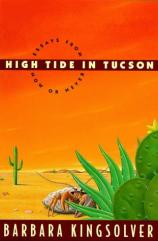Reading Group Guide
Discussion Questions
High Tide in Tucson

1. How would you define the main theme of each essay? In what ways does each of these primary themes reappear throughout the collection? How does Kingsolver signal those themes and issues that are of the highest importance to her? Why do you think she ascribes such importance to these themes and issues?
2. Several of the essays address issues at the forefront of social and political debate today (for example: children in American culture, the environment, politics and art, and models of the family). Why does Kingsolver address these specific issues? What side of the debate does she take in relation to each, and what arguments and evidence does she present in support of her positions? Do you agree or disagree with her arguments?
3. How does Kingsolver's reverence for the past and for nature relate to her astonishment and joy in the face of life's wonders, her political involvement, and her steadfast allegiance to the powers of art? How does she view the arts in relation to the past, to nature, and to life itself? Do you agree with her pronouncements in this regard? What value does she ascribe to moral, social, political, and artistic responsibilities; and how are those responsibilities interrelated?
4. In "In Case You Ever Want to Go Home Again," Kingsolver writes, "From living in a town that listened in on party lines, I learned both the price and value of community." What are the prices and the values of community as revealed in this and other essays? Does your own experience corroborate, add to, or contradict these prices and values?
5. Do you agree with Kingsolver's contentions, in "How Mr. Dewey Decimal Saved My Life," that we live in a culture "that undervalues education . . ., undervalues breadth of experience . . ., downright discourages critical thinking . . ., and distrusts foreign ideas"? What evidence can you apply to support or refute these contentions?
6. Kingsolver begins nearly all of her essays with a personal experience or observation and then proceeds to a more universal or general truth, judgment, or conclusion. Do her judgments and conclusions always follow coherently from the personal statements that precede them? Are her generalizations - for example, "Always and forever, the ghosts of past anguish compel us to live through our children;" "Reproduction is the most invincible of all human goals" - always appropriate and defensible?
7. Do you agree with Kingsolver's statements, in "Somebody's Baby:" that "the way we treat children - all of them, not just our own, and especially those in great need - defines the shape of the world we'll wake up in tomorrow;" and that "Children deprived - of love, money, attention, or moral guidance - grow up to have large and powerful needs"? Are her statements about children relevant to recent reported events involving children in need or in trouble?
8. Why does Kingsolver ascribe so much importance to ethnic and cultural diversity and differences? What does she mean when she writes, "I want my child to be so completely familiar with differences that she'll ignore difference per se and really see what she's looking at"?
9. In addition to "Careless recreation, and a failure of love for the landi ("The Memory Place"), what kinds of environmental and other pollution and what kinds of preservation does Kingsolver single out as being of primary importance? Why is care of the land so important to what she calls "The Memory Place"? What is your "memory place," and what is required to maintain its value and integrity?
10. What are the lessons learned by traveling to such sites as the Canary Islands, Benin, Hawaii's Haleakala crater, and other distant and different landscapes? How do Kingsolver's responses to these places compare with your own responses to distant places visited or lived in?
11. "Art is entertainment but it's also celebration, condolence, exploration, duty, and communion," Kingsolver insists, in "Careful What You Let in the Door." How may the elements of this statement be applied to these essays, and to Kingsolver's novels and short stories?
High Tide in Tucson
- Publication Date: October 11, 1995
- Hardcover: 288 pages
- Publisher: HarperCollins
- ISBN-10: 0060172916
- ISBN-13: 9780060172916








